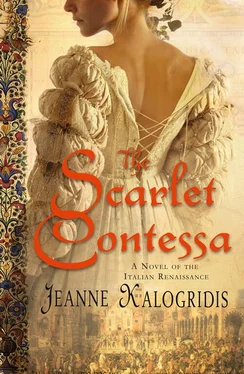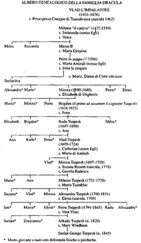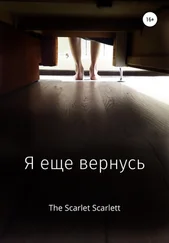“At the swords of assassins,” I answered. “Giovanni Lampugnani and Carlo Visconti. His Grace still lies on the Point of the Innocents.”
“Visconti,” she repeated tonelessly. “Is everyone else safe?”
I nodded. “I think so.”
“Good.” She looked at Caterina and sighed. “Poor child.”
Francesca had set down the tray and was crying, but Bona threw back the covers and swung her thick legs over the side of the bed.
“Francesca,” she said, a bit sharply. The chambermaid stopped her tears and looked up, anguished.
“Call Leonora, and help me get dressed,” she said, and glanced up at me. “And Dea, go and tell Cicco the news if he hasn’t already heard, then bring him to me.”
After speaking with her husband’s top aide, Bona ordered that Galeazzo’s body be washed at Santo Stefano and dressed in a suit of gold brocade. By dusk, the duke’s clean corpse was resting on a table in Santo Stefano’s sacristy. There was no public viewing—or private, for that matter—as the duke had suffered fourteen disfiguring wounds. His mortal remains lay in the sacristy another full day, the twenty-seventh, the day His Grace was to have visited the church of San Giovanni to celebrate the feast of Saint John the Evangelist. All the while, Bona and Cicco worked together to prevent any chance of an uprising against the Sforza dynasty; soldiers were stationed at strategic points along Milan’s empty streets.
Late that night, Bona sent a few trusted servants to Santo Stefano. Under cover of darkness, they stole into the church, removed the corpse, and took it across town to the cathedral known as the Duomo, across the broad street from Porta Giovia. There, they pried open the top of the casket holding the remains of the duke’s father, Francesco Sforza, and laid Galeazzo on top of them.
Many a mass was said later for Galeazzo’s soul, but there was to be no funeral, public or private, no tomb, no monument of stone, no plaque revealing where the duke lay. He had provoked such enmity during his thirty-two years that it was deemed safest to dispense with such things, lest those who despised him take revenge on his corpse.
Bona never came to bed that night, but remained conferring with Cicco and Galeazzo’s other advisers. I undressed in the small closet off the duchess’s chamber and, as I was pulling my nightdress over my head, Caterina’s nurse entered and begged me to come attend her young charge.
I found Caterina huddled on her bed, arms wrapped around her knees, rocking. The slender, long lines of her girlish body showed beneath the fine wool nightgown; her long pale curls had been neatly plaited, though shorter tendrils framed her oval face. Her cheeks were flushed, the lids of her bloodshot eyes swollen. When I entered the room, she glanced up, oddly hopeful, and curtly motioned for her nurse to leave the room. I was surprised to see that the three cots where her attendants slept were empty, though the blankets were disheveled and the sheets still bore the impress of bodies. No doubt their mistress had thrown them from their beds without warning.
When we two were alone, she motioned for me to sit on the bed beside her—an unusual liberty for her to grant—and said, in a voice that was hoarse from weeping:
“You knew my father was going to die. You knew the very moment. How?”
“I don’t know,” I began, but she made an impatient gesture for silence.
“I will pay you.” Her gaze was as naked and earnest as I had ever seen it. “Whatever you want, and I will say nothing to anyone about it. Only you must tell me the secrets of your magic.”
I shook my head. “There is no secret, Madonna.”
Her features contorted with anger. “Or I can have you tortured until you confess everything you know. I could turn you over to the Church as a witch.”
I was too weary from grief to care, and it surely showed in my voice and expression. “Then turn me over to them, Madonna, and I will tell them what I am telling you: I know nothing about magic.” It was true; I had not yet studied Matteo’s ritual. “I saw your father’s death, but I don’t understand how I knew.”
She remained silent. I rose, intending to ask permission to leave, but she motioned sternly for me to sit back down.
“Why did you save me?” Her voice was taut with emotion.
“Why would I not?” I countered.
She drew a long hitching breath and loosed a torrent of childish tears. “Don’t leave me,” she sobbed, and threw her arms about my shoulders, pulling me to her. “Don’t ever leave me, Dea!”
Her distress was so honest, so wrenching, that I returned the embrace. “Hush, Madonna, hush,” I murmured maternally. “I’ll stay as long as you like.”
I soothed her for several minutes until she finally fell quiet, then let loose a hiccup.
“I hated my father,” she said suddenly, her chin resting upon my shoulder. “Hated him.” I waited for her to speak of his heinous crimes, but instead, she added, “He never loved me—not at all. He loved my beauty. I was only a bauble to him, like his jewels or his choir or his mistresses . . . something he would parade in front of others to provoke their envy.”
“That’s not true,” I said perfunctorily, but she drew back and looked solemnly into my eyes.
“It is true, Dea. Men don’t deserve to be loved.”
“I knew one who did,” I said with sudden vehemence.
Caterina did not let me leave her that night. She would not even let me go to one of the cots, but insisted I lie beside her on her soft feather bed. She was exhausted from weeping and quickly fell asleep; I lay listening to her soft breath and thought about the duke, and Matteo, and the mysterious cards.
On the next day, the Feast of Saint John, news of the duke’s assassins arrived in the afternoon and spread swiftly throughout the court. Shortly after the murder, Lampugnani’s body had been stolen from the Church of Santo Stefano by a group of young toughs and dragged over the city’s cobblestones. By the time the crowd was done, the corpse was mutilated beyond recognition, and the citizens took gruesome glee in feeding the tattered remnants to pigs.
Visconti and the third conspirator, a youth named Olgiati, who had gone into hiding shortly after the murder, had been betrayed by relatives and captured; they were awaiting their fates in Porta Giovia’s dungeon. Bona had coolly sentenced them to the wheel, where they would be ripped in two from neck to loins while still alive.
According to her chambermaids, the duchess had not shed a single tear since hearing of her husband’s death. Newly widowed myself, I felt certain grief would soon overcome her, and wanted to be at her side when the storm finally broke. But one of Galeazzo’s attendants informed me that the duchess would not need my services that day; I was at liberty, except for the fact that I needed to gather up my belongings, as the court was to return to Pavia the very next morning.
I headed for my little closet, thinking to make quick work of packing. I had not made it far, however, when Caterina, curiously unaccompanied, came running after me. She was breathless and pale in a high-necked black velvet gown; her hair had not yet been crimped, but hung uncombed and tousled about her shoulders, free of nets or veils. Apparently she had seen me pass by her chambers while her ladies were in the midst of grooming her. I stopped and turned to look askance at her, until I noticed the red velvet box in her hands.
“Where are you going?” she gasped.
There was no point in lying; Caterina would have her way regardless. “To my closet, Madonna,” I admitted. I could scarcely lift my gaze from the box.
She looked about to reassure herself no one could hear us. A pair of launderesses were down at the far end of the loggia, laughing as they collected soiled linens from the rooms and paying us no heed.
Читать дальше












